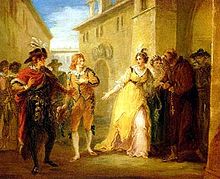Self knowledge is perhaps the most significant theme in so-called joyous comedy (begins with music and ends with a song) of William Shakespeare, Twelfth Night. At the start of the play only Feste, a singing fool and Viola, disguised as a page, for her master, the Duke Orsino have a reasonable degree of Self knowledge. Orsino believes that he is in love with Olivia, but the falsity of this belief is shown by the fact that when they finally do meet they are arguing within a few seconds.
Orsino never goes to meet Olivia, but sends messages to her through others, and it is the idea of being in love that attracts him. His lack of Self knowledge means that he cannot come to a realistic appreciation of anyone else's characters. It takes most of the play for him to realize that he is really in love with Viola. Olivia believes her desire to withdraw from the world is a result of grief at the loss of her father and brother, whilst in reality it is fear of a cruel world and a desire to lock her away from danger that prompts her. She does not realize this about herself, and so is defenseless against the first person (Viola) who dares to challenge her and present her with a slice of the real world. It is a subsidiary theme of the play that those who do best in life are those who face it and live it to the full, not those who try to hide away. In a tragedy Olivia’s lack of judgment would lead to her death; as it is, she was to suffer, but is allowed to fall in love where that love can be met by someone who will prove a true husband to her.
Orsino never goes to meet Olivia, but sends messages to her through others, and it is the idea of being in love that attracts him. His lack of Self knowledge means that he cannot come to a realistic appreciation of anyone else's characters. It takes most of the play for him to realize that he is really in love with Viola. Olivia believes her desire to withdraw from the world is a result of grief at the loss of her father and brother, whilst in reality it is fear of a cruel world and a desire to lock her away from danger that prompts her. She does not realize this about herself, and so is defenseless against the first person (Viola) who dares to challenge her and present her with a slice of the real world. It is a subsidiary theme of the play that those who do best in life are those who face it and live it to the full, not those who try to hide away. In a tragedy Olivia’s lack of judgment would lead to her death; as it is, she was to suffer, but is allowed to fall in love where that love can be met by someone who will prove a true husband to her.
Malvolio lacks Self knowledge, and hence knowledge of other. He cannot see that he is only a steward, and thus can deceive himself into thinking that Olivia really is in love with him. It is not so much a question of Malvolio being duped and trapped by Sir Toby and Maria; rather, it is his own vanity that stops him from perceiving the truth, until it is cruelly but comically forced upon him by his enemies.
 |
| image: wiki Act V, Scene i (William Hamilton, c. 1797). |
Feste has a shrewd insight into his own nature and that of other, but is condemned to be the fool, whilst he is probably the most perceptive character in the play. He knows himself, but it is open to argument whether or not he can control himself over his hatred for Malvolio. When viola says ‘Disguise, thou art wickedness / Wherein the pregnant enemy can do much’ she is pointing to the central issue of Twelfth Night: people who disguise themselves – from themselves, or from other people – are courting disaster. Self knowledge and honesty are the oil which causes the whets of society to run smoothly, and which allow people to live in harmony with each other.
The theme of self-knowledge is subtly explored through various characters and situations:
👀Disguise and Deception: Characters like Viola, who disguises herself as Cesario, and Malvolio, who is fooled by a fake letter, highlight the theme of self-deception. They must confront their own mistaken perceptions to achieve self-awareness.
👀Identity Confusion: The play's comedic elements arise from the confusion of identities. This confusion ultimately leads characters to question their own feelings, desires, and self-identities.
👀Reflection and Discovery: Through mistaken identities and love triangles, characters reflect on their own emotions, biases, and attractions. This introspection prompts personal growth and self-discovery.
👀Resolution and Acceptance: By the play's end, characters like Orsino and Olivia come to terms with their true feelings and find self-acceptance, underscoring the theme that self-knowledge is a path to genuine happiness and fulfillment.
G. B. Harrison {ed. Shakespeare: The Complete Works. New York: Harcourt, 1952
The Norton Shakespeare. (n.d.). The Norton Shakespeare | Stephen Greenblatt, Walter Cohen, Suzanne Gossett, Jean E Howard, Katharine Eisaman Maus, Gordon McMullan | W. W. Norton & Company. https://wwnorton.com/books/9780393264029
Shakespeare’s dramatic art. : History and character of Shakespeare’s plays : Ulrici, Hermann, 1806-1884 : Free Download, Borrow, and Streaming : Internet Archive. (n.d.). Internet Archive. https://archive.org/details/shakespearesdram01ulri

Comments
Post a Comment
Drop any query, suggestion or comment here.